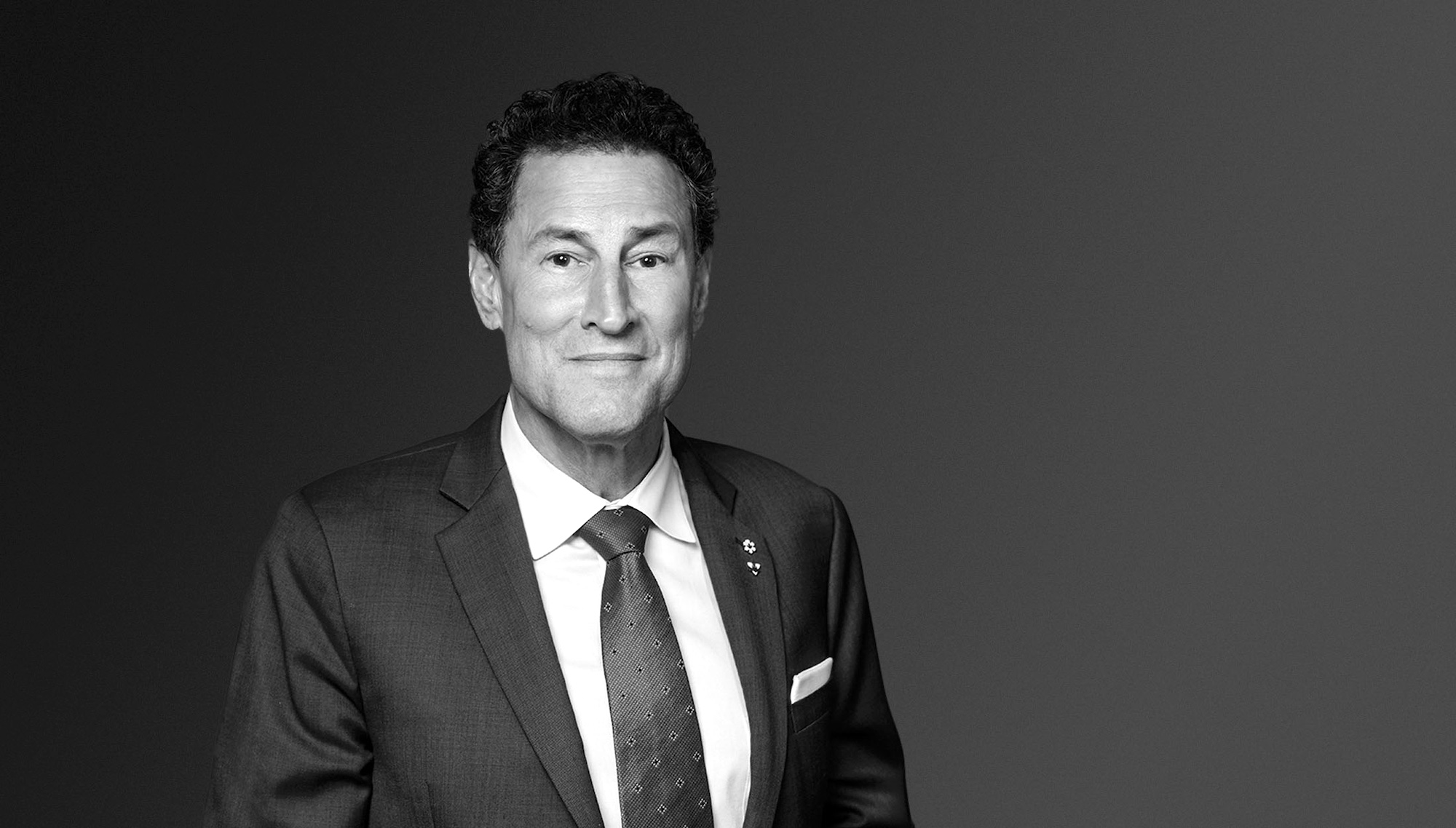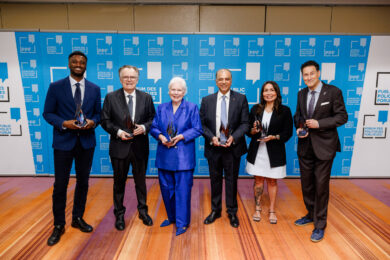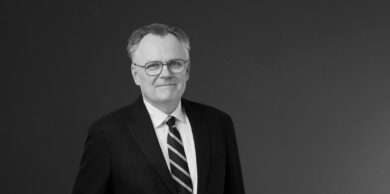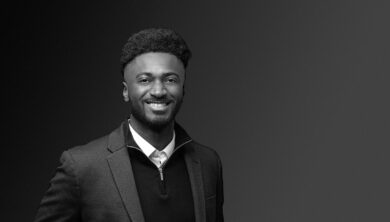
Steve Paikin — 2025 Hyman Solomon Award for Excellence in Public Policy Journalism
“I’ve always thought that our great responsibility is to shine a light and bring attention to problems that are happening in our midst without necessarily having all the answers about how to solve those problems.”
You know Steve Paikin is a devoted Canadian when he likens his journey as a political reporter to a long canoe ride.
“I didn’t discover until I went to university that I wanted to be in journalism. I got a job, I did okay at it. That led to another job. I did okay at it. That led to another job. I’m still doing okay at it. There has never been a master plan. I basically got into this career of journalism as I would stepping into a canoe and I’m going down a river, and wherever the canoe is taking me, I am going.”
At a time of technological disruption and media fracture, Paikin exemplifies a calm presence in — pardon the metaphorical extension — turbulent waters.
“I don’t think we’ve changed the way we do things at all in my 33 years at TVO,” says Paikin of the publicly funded media company serving Ontario, when asked if he’s felt compelled to change his style of coverage as public discourse has grown more combative. “If people want to see the food fight, they can go somewhere else. If they want to see guests treating each other badly with gratuitous insults, they can go somewhere else. … I make no effort to compete in that other swamp.” That he has never been tempted to work for a national or international media company is testament to the principles of TVO which allow him to pursue the journalism he admires, he says.
Born and raised in Hamilton, Ont., he began his career covering sports before joining TVO in 1992, where he has hosted a number of political and current affairs programs. For almost 20 years now he has hosted The Agenda, which examines social, political, cultural and economic issues facing Canadians.
Well-known in media circles for his disciplined and prodigious output, the member of the Order of Canada and Order of Ontario and father of four adult children has also written nine books and produced several hour-long documentaries. In addition, he co-hosts a weekly podcast on Ontario politics and writes a column for tvo.org.
Never has his fascination with public service faded. “I still see [politics] fundamentally as the art of the possible. In spite of everything, it still has the capacity of improving our lives, and the more I talk to people who are in it and who have been in it, I haven’t heard anything to dissuade me of that view.”
Anecdotes about politicians come easily to his mind. Jane Philpott, physician, former Liberal cabinet member and author of Health for All, A Doctor’s Prescription for a Healthier Canada, recently told him that a politician could accomplish more at the cabinet table than he or she could accomplish outside of government in 10 years. Years ago, Bill Davis, former Ontario premier, told him that his job at Torys LLP was not nearly as inspiring as his 25 years in public life, despite the better pay. “This job on its most fascinating day can’t touch being Premier of Ontario on the dullest,” he explained to Paikin.
When he once asked Dennis Timbrell, Minister of Health in Bill Davis’ government, why he liked his job, the response was immediate: “Because if I read an article about something that wasn’t working, I could go into work that day and do something about it and fix it,” Paikin recalls. “In a world where so many people have given up and we don’t seem to think we’re capable of doing anything anymore, that’s a lovely mission statement,” he adds.
“I still see [politics] fundamentally as the art of the possible. In spite of everything, it still has the capacity of improving our lives, and the more I talk to people who are in it and who have been in it, I haven’t heard anything to dissuade me of that view.”
Paikin acknowledges that many in the general population have become doubtful of political motives, leading audiences to disengage. “I can’t tell you how many conversations I’ve had over the years with people who’ve said things to me like, ‘I don’t pay attention to any of that stuff; they’re all the same and therefore I have no interest,’ which I find somewhat disappointing because of course they’re not all the same and who you vote for, in my view, matters a great deal. But then, we do have shows all the time with young people who are deeply involved in the issues and very active on things, and they can have an effect of restoring my confidence in the notion that I haven’t spent the last 42 years of my life in pursuit of something completely useless.”
Still, the younger generation can be more prescriptive in their approach to government policy, he adds. “I’m not sure a lot of [younger] people are on the same page as me. A lot of them want a particular [policy] outcome for their journalistic involvement. [They] feel journalism has a more Messianic role to play including recommending solutions. … I’ve always thought that our great responsibility is to shine a light and bring attention to problems that are happening in our midst without necessarily having all the answers about how to solve those problems. I’ve never thought that that was particularly our responsibility as journalists. That’s the responsibility of the politicians and the decision makers. Our job is to let them know when things aren’t going well and their job is to fix it.”
He admits his view is “old-school” and wishes more adhered to journalistic objectivity. “I would love to see a lot more humility in legacy media and social media about what the solutions are,” Paikin says. “There’s a lot of very smart people who are trying to solve a lot of the problems that we have in this country right now. And a lot of those problems still persist. And I don’t think it’s because the people who are trying to find the solutions are stupid. It just may be a little more complicated than what we can sum up in a 15-inch article in a newspaper.”
It’s a challenging time for legacy media, he acknowledges, and has been for a number of years. Paikin cites a comment in 2009 made by David Simon, former Baltimore Sun reporter and creator of the HBO series, The Wire, at a U.S. Senate Commercial Committee on the future of journalism. “I see us entering the golden age of municipal corruption,” he recalls Simon testifying. Asked why, he pointed out the lack of local media left to hold municipal politicians to account.
Not only have newspapers collapsed or shrunk, but Meta is the latest social media company to abandon fact-checking. Elon Musk, the world’s richest man and ally of President Donald Trump as well as owner of X (formerly Twitter), pronounced recently on his social media platform that “You are the media now.”
“It doesn’t take as much skill to be a journalist as it does to be, say, a cardiologist,” Paikin explains, echoing others who have bristled at Musk’s comment. “You don’t have to go to university for as long. But there is something to it. There are standards applied to it. And there’s a credo that you should believe if you’re in that game. Not everybody on X adheres to that. It’s a public square and people can say whatever they want, and they can try to defend themselves however they want. Everybody has a voice but that’s not the same as journalism and the two should not be confused for one another.”
So far, Canada’s politician arena is more fact-based than that of the United States. “I don’t see in Canada yet the extraordinary alternative reality universes that I see in the United States. And let’s hope we can keep that because it’s one of the things that is good for our democracy and because it can keep most of us sane.”
That doesn’t mean that Canadian elections have always been civil and polite, he’s quick to point out. “I’ve written books about Bill Davis and John Turner and the two of those guys were involved in some incredibly tough, bruising election campaigns.”
With a Liberal leadership race underway and a federal election on the horizon, Paikin, who has moderated political debates and hosted town halls, is looking forward to the “great clash of ideas,” adding: “I’ve never been cynical about anything. I’ve thankfully been blessed with a deep curiosity about how the world works.”





